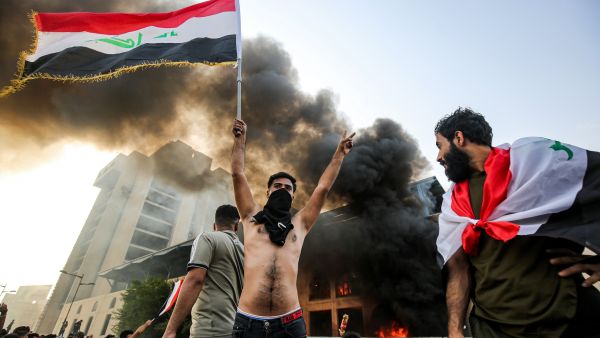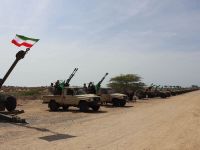Protests turned deadly in Baghdad after clashes between Iraqi protesters and security forces in central Baghdad as at least two demonstrators were killed overnight, security and medical sources said on Monday.
They were the first fatal incidents for months at Tahrir Square, which became a symbol of anti-government protests during months of deadly mass unrest last year.
The protesters had begun marching from Tahrir to nearby Tayaran Square chanting about worsening power cuts during a heat wave that has sent temperatures soaring above 50 degrees centigrade in Iraq.
Security forces tried to contain the march and fired tear gas, police, medics and protesters said. Protesters threw stones and petrol bombs, a security source said.
Medics at two hospitals in Baghdad said two men were hit in their head and neck with tear gas canisters and died of their injuries overnight. Several members of the security forces suffered minor injuries, police said.
Iraq’s biggest anti-government protests for decades broke out last October and continued for several months with hundreds of thousands of Iraqis demanding jobs, services and the removal of the country’s ruling elite, which they say is corrupt.
The months-long protests caused the resignation of Prime Minister Adel Abdul Mahdi, who was replaced in May by incumbent Mustafa al-Kadhimi, a former intelligence chief.
Since October, over 600 demonstrators have been killed during protests due to live fire and tear gas used by security forces. But Kadhimi also has to cope with an unprecedented economic crisis spurred by falling oil prices and a surge in virus cases.
Iraq’s Health Ministry has reported 110,032 cases, including 4,362 deaths.
Iraq is facing electricity shortages amid searing summer months, when temperatures can top 50 degrees Celsius, or about 122 degrees Fahrenheit.
A senior Electricity Ministry official said the power supply fell short by 10,000 megawatts this summer, down 1,000 megawatts, compared to last year, due to lack of maintenance in several power plants because of lack of funds in state coffers.
This has also slowed investment projects to add more power to Iraq’s grid, he said, speaking on condition of anonymity in line with regulations.
The spread of the coronavirus had halted mass rallies and prompted most protesters to leave, with only a few remaining at the tent sit-in at Tahrir Square, once the epicentre of the protest movement.
Ali al-Bayati, a spokesman for the semi-official Independent High Commission for Human Rights, also said two protesters had been killed. The commission said their reports indicate live fire and pellet rifles were used to disperse protesters.
Earlier, Iraqi security officials said demonstrators had hurled firebombs and stones at the riot police, while rights monitors said security forces set fire to demonstrator tents at Tahrir Square.
A statement from the military spokesman Yahya Rasool said security forces had been given strict instructions not to use violence against peaceful protesters “except in the event of extreme necessity.”
He said the events in Baghdad squares were “unfortunate” and that a probe was underway into what happened.
“We are aware of the difficulties that our people are going through,” Rasool said.
“This government, with its short life, is trying to address (them) under exceptional economic and health conditions,” he said.
This article has been adapted from its original source.








